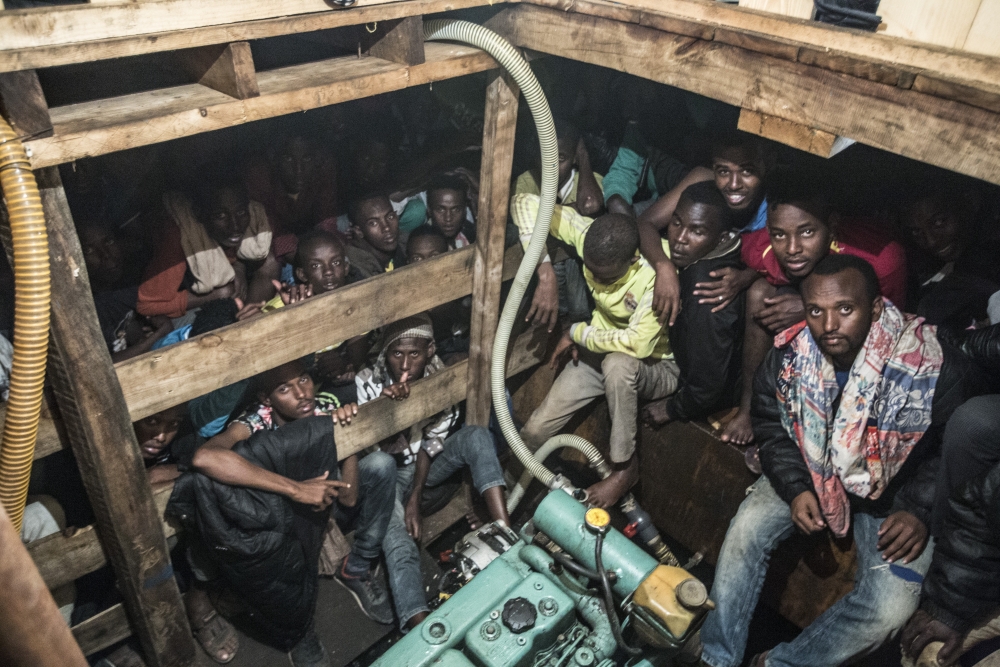Video footage of African migrants detained on their way to Europe being sold as slaves in Libya has provoked outrage and dismay in Africa and the wider international community. As a result, migration has been placed at the top of the agenda of this week’s fifth triennial African Union-European Union summit in Abidjan, Côte d’Ivoire.
For Europe, migration has become an almost existential problem. The influx in 2015 of more than one million refugees and migrants fleeing war, persecution, and poverty in the Middle East and Africa created deep divisions and raised difficult questions about the EU’s commitment to open borders. It is threatening the viability of the union and providing an opening for right-wing, anti-immigrant, anti-Islam political parties and movements across the continent.
For Africa, despite the tragic deaths of many of those in transit, the migration of its citizens to Europe has not been a major concern. The vast majority of African migrants, contrary to perceptions in Europe, move between countries on the continent, which places great strain on host nations such as South Africa and Senegal.
Unsurprisingly, these opposing views mean that the EU and the AU have very different priorities. The EU is doggedly focused on trying to prevent illegal migrants reaching its shores whereas the AU is looking for ways to increase legal routes to Europe for Africans. It is essential that these two positions are reconciled.
Leaders from Africa and Europe last met in 2014, and until now African resistance meant that migration was not even formally tabled for discussion. But the emergence of the images of modern-day slave trafficking, which followed oral accounts of Libyan slave auctions that surfaced in April this year, has shaken the African Union (AU) out of its torpor.
For its part, Europe has developed a two-pronged strategy to curb African migration and what it sees as the associated danger of terrorism.
First, it has tried to address the root causes of instability, forced displacement and illegal migration through investment compacts with selected countries. These deals have been heavily criticised for offering incentives for reducing migrant flows to repressive regimes, such as Sudan and Eritrea, whose own domestic policies fuel the exodus to Europe. While this containment policy had some success in reducing migrants transiting through Niger, for example, the reductions have often been short-lived as security forces are easily bribed by smugglers.
Second, the EU and its member states have tried to seal their Mediterranean Sea borders by increasing their military presence and counter-terrorism operations in the Sahel – a key transit route for illegal migrants. Taken together, these measures aimed at reducing migrant flows show that the EU is willing to do “whatever works”, as one European diplomat put it.
What the AU sees as the EU’s “fortress approach” to border control, coupled with ham-fisted European diplomacy, has alienated Africa. So too has the tendency of the media and populist politicians in Europe to link African migrants to increased terror attacks. A myopic focus on migration has increasingly become the lens through which the EU views its peace and security relationship with Africa.
Discussions in Abidjan this week should focus on gradually increasing access for skilled African workers, who could be essential given Europe’s rapidly aging population. The AU and EU should also look for common ground outside the question of migrant flows to and from Europe, for example by focusing more on the root causes of migration – something both institutions profess to have an interest in.
Europe’s panic over migration and terrorism represents a significant opportunity for Africa. The EU and its member states have money to spend provided they can be assured of quick wins that will help calm the fears of citizens. “If we talk about migration, anything is possible. […] we’ll pay,” explained one European diplomat.
If the AU and African governments really want to address the root causes of migration, they should leverage support for border control and fighting jihadists and terrorists against EU investment in education, job creation, better governance more evenly distributed economic growth throughout Africa.
This, however, requires coordination. Until now, competing national and regional interests have overridden a more unified African approach to migration that could bring continent-wide benefits. But the grim reality of the migrant slave trade in Libya seems to have stirred the pan-African conscience, and continental cooperation may now be possible.



